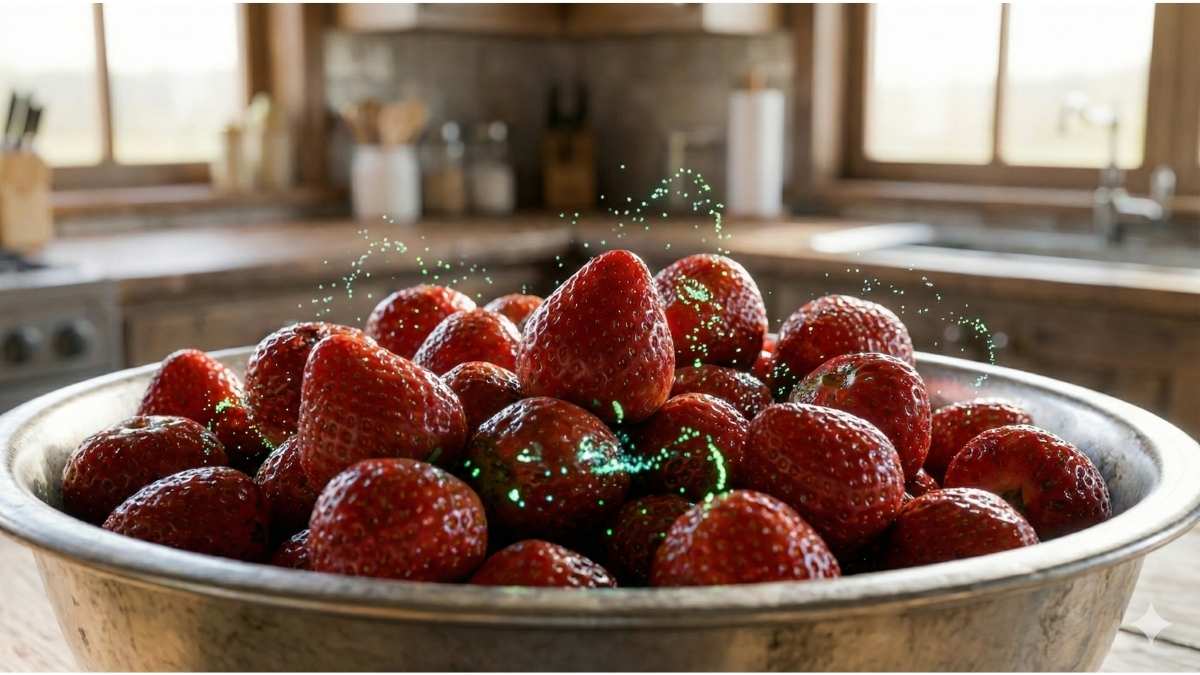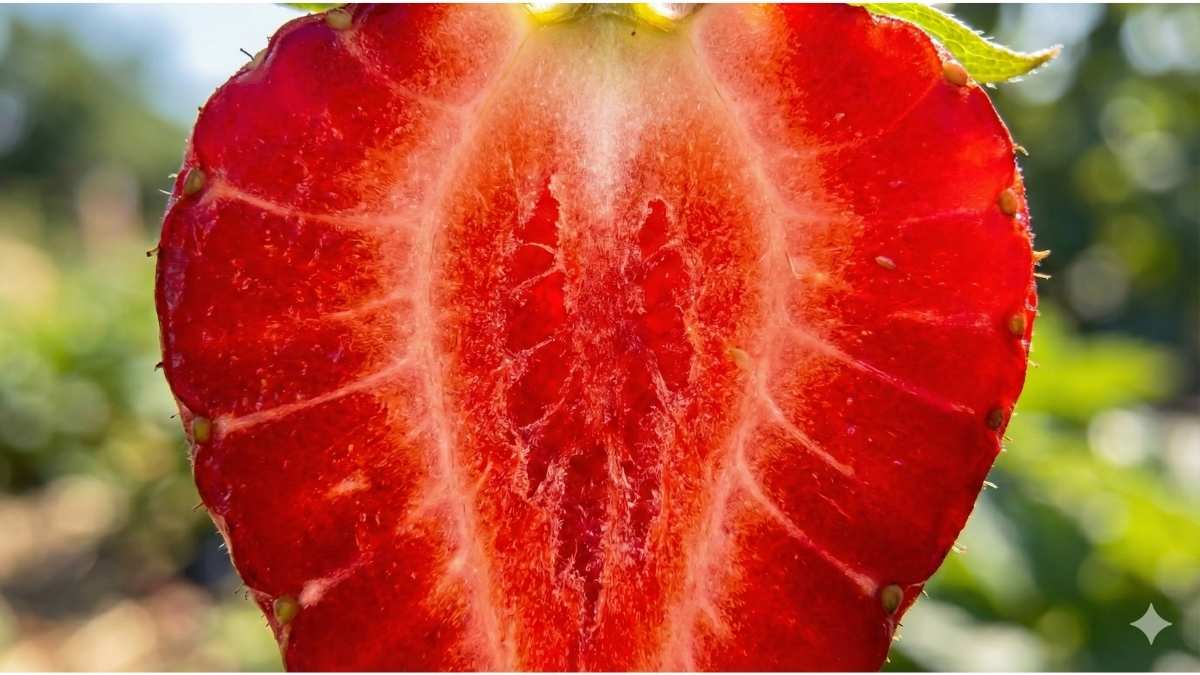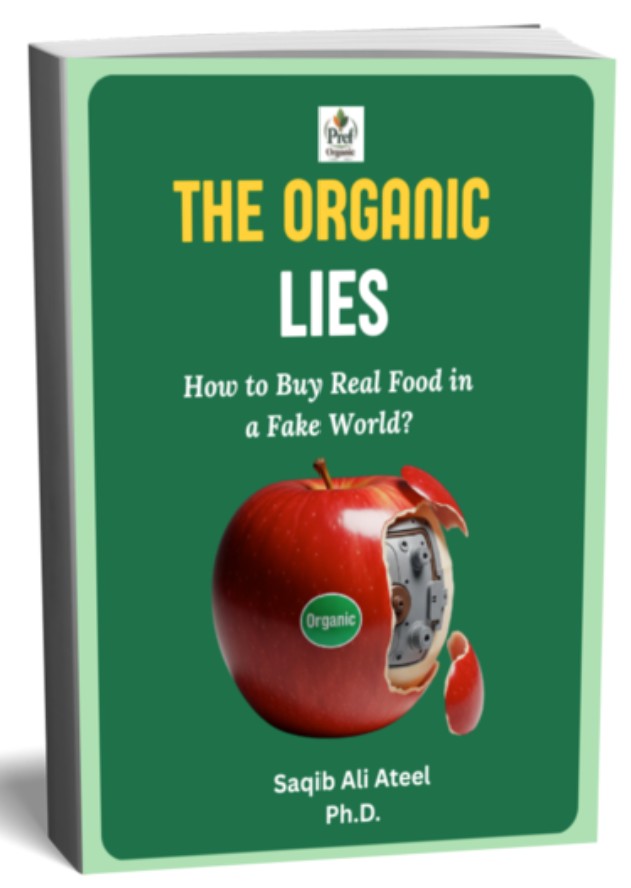Organic Strawberries vs. Conventional: Why the
"Dirtiest" Fruit Demands the Cleaner Choice ❤️
We’ve all been there: standing in the produce aisle, staring at the bright red strawberries, and feeling that little knot of worry. Is it worth the extra cost? We all know the headlines—strawberries are almost always ranked number one on the "Dirty Dozen" list in fruit.
That fact alone makes choosing between Organic Strawberries vs. Conventional feel like a decision about safety, not just shopping. As a PhD student in agriculture who grew up on a family farm and practices organic gardening, I promise to give you the honest, scientific truth. I want to cut through the confusion and show you exactly what is in your fruit and how that impacts your health, so you can stop worrying and feel absolutely confident in your choice.
My research suggests that we need to look past the general labels. We need to focus on three critical, data-driven areas: Purity, Power, and Protection. This information will empower you to become the proactive protector of your family’s health.
Definitive Safety Guide: Maximizing Health ROI with Organic Strawberries
- 🚫 Purity Mandate: Almost 99% of conventional samples contain detectable pesticide residues, guaranteeing exposure to a complex chemical cocktail, including possible carcinogens like Bifenthrin.
- ✨ Power Payoff: Organic cultivation yields measurably superior nutrition, delivering up to 51% higher concentrations of heart-protective Anthocyanins and Flavonols.
- 👶 Protection Priority: Conventional berries frequently fail strict baby food safety standards, exceeding safe residue limits by 12 to 120 times—a risk only organic produce consistently eliminates.
- ❤️ Optimal Protection: Ensure your effort to eat healthy is not undermined by toxic interference; choosing organic is the ultimate preventative strategy to maximize cardiovascular benefit and longevity.
I. The Purity Question: Toxicological Risk of
Conventional Strawberries
When we talk about the toxicological risk, I want to lead with empathy. Your concern about the "Dirty Dozen" is absolutely valid. The data confirms that this is not an overly worried reaction; it’s an urgent, informed priority.
Growing up on a farm taught me that the strawberry plant is delicate. It's close to the ground and has soft skin, making it an easy target for mold and pests. Conventional farming manages this vulnerability with an intricate and pervasive chemical system, and that is precisely why we need to pay attention.
The Pervasive Problem of Pesticides in Conventional
Strawberries
 The hidden hazard: Conventional strawberries are the most chemically contaminated crop, averaging eight different pesticide residues per sample, including possible carcinogens.
The hidden hazard: Conventional strawberries are the most chemically contaminated crop, averaging eight different pesticide residues per sample, including possible carcinogens.The evidence from USDA scientists is unambiguous. When they test conventional strawberries, they find a near-universal level of contamination:
1. Near-Total Contamination: Think about this number: Almost 99% of conventional strawberry samples had detectable residues of at least one pesticide. If you grab a handful of conventional berries, you are almost guaranteed a chemical exposure.
2. The Complex Cocktail: It’s not just one chemical, either. Non-organic strawberries average eight different pesticide residues per sample. In fact, some single samples contained residues of 23 different pesticides and their breakdown products. This is what we call the "poly-pesticide cocktail effect." It’s a complex chemical load you are ingesting every time.
3. High-Hazard Chemicals: Beyond the sheer volume, the issue is the type of chemicals involved. These findings highlight the presence of serious compounds:
o Bifenthrin: This insecticide was found on over 29% of samples. Regulators have designated it a “possible human carcinogen”.
o Carbendazim: This is a hormone-disrupting fungicide detected on 16% of samples. It's so concerning that the European Union has banned its use.
From an academic perspective, my research suggests that while legal limits are important, the total, chronic effect of ingesting multiple chemicals like possible carcinogens and hormone disruptors together is largely unmodeled in standard risk assessments. This introduces an unquantified chronic health risk, which is exactly what we want to avoid.
The Critical Need for Purity for Vulnerable Groups
For many of us, the choice to buy Organic Strawberries vs. Conventional ones moves from a personal preference to a critical risk-management step, especially if you are caring for vulnerable loved ones.
Straightforwardly, conventional strawberries frequently fail to meet the strict safety standards set for baby and toddler food. The total residue concentration in conventional samples can exceed this safety limit by 12 to 120 times. The good news?
Only Organic Strawberries consistently meet this safety standard.
If you are a pregnant woman or shopping for young children, you are the proactive protector of their health. Choosing organic eliminates this substantial and unnecessary chemical load, which is the most definitive action you can take.
A Quick Thought on Washing: You should absolutely continue to wash all your produce to reduce the risk of foodborne illness. But let’s be realistic. In my own home garden, I know these chemicals are designed to protect the fruit in the field. Pesticides are engineered to penetrate the thin skin or are protected by waxy coatings.
Washing with water only removes a proportion of residues; it is not a guaranteed method for eliminating the chemical load. The toxic level is determined by the growing method, not by your sink routine.
II. The Power Differential: Maximizing Phenols and
Antioxidant Levels in Organic Strawberries
The safety argument is compelling, but the case for organic becomes absolutely definitive when we look at the nutritional payoff. The choice between Organic Strawberries vs. Conventional is about both purity and power.
When you choose organic, you aren't just paying to exclude toxins; you are paying to include a measurably superior concentration of the very compounds that make strawberries healthy: the polyphenols and antioxidants. This is where the Antioxidant Levels in Organic Strawberries demonstrate their superior value.
The Science of Superior Nutrition
Strawberries are rich in compounds like anthocyanins (their deep red pigment) and flavonols. These are the molecules that act as your body's front-line defense against inflammation and cell damage.
The evidence isn't anecdotal; it’s scientific. A comprehensive meta-analysis looked at hundreds of peer-reviewed publications and confirmed that organic crops are nutritionally superior. For strawberries, the data is striking:
- Anthocyanins: Organic crops showed an estimated 51% higher concentration. Anthocyanins are powerful cardiovascular protectors.
- Flavonols: Organic crops showed an estimated 50% higher concentration. These are linked to reduced chronic disease risk.
- Total Antioxidant Activity: Overall, the antioxidant capacity was estimated to be 17% higher in organic crops.
My research suggests this is a huge return on investment. For every handful of organic strawberries you eat, you are providing your body with a significantly greater dose of the precise molecules known to fight disease.
The Stress Hypothesis: Why Organic Berries are More
Potent 💪
This nutritional boost isn't accidental. It’s causally linked to the way the plant is farmed—what researchers call the "Stress Hypothesis."
Let's think about this like a bank account. If I give a strawberry plant all the chemical defenses it needs (synthetic pesticides), it doesn't need to generate its own. It's like having a trust fund; there's no incentive to work.
- In the organic system, the plant has to rely on its natural immune response. When it faces mild stress from insects or fungi, it generates these chemical byproducts—the polyphenolics—as a defense mechanism.
- These compounds often taste bitter, which serves as a natural deterrent to pests.
When you cultivate strawberries organically, you are essentially forcing the plant to build its own strong, potent immune system. This simple act—the avoidance of synthetic chemicals—is the direct reason why the berries are both toxin-free and nutritionally superior.
Quality and Sensory Nuances
Does this translate to a better eating experience? Studies suggest it often does. My hands-on experience shows that healthy, vibrant soil produces better fruit. Research supports this, indicating that organic strawberries can have greater dry matter, higher soluble solids, and firmer pulp, which contributes to a better shelf life and mouthfeel. Some sensory panels even judged specific organic varieties to be sweeter, with better flavor and overall acceptance.
III. The Protection Payoff: Heart Health and Longevity 🧠
This is where the entire discussion culminates. We are linking the Purity (low toxic load) and the Power (high phenolic content) to your ultimate goal: Heart Health and longevity.
The Foundation: Strawberries as Cardioprotective
Superfoods
We already know that strawberries are magnificent for your heart. They are an excellent source of Vitamin C, magnesium, and potassium. Their high antioxidant content helps neutralize free radicals, curb inflammation, and guard against high cholesterol, stroke, and heart disease.
The question is, how does the choice between Organic Strawberries vs. Conventional ensure you are maximizing this benefit?
The Synthesis: Maximizing Benefit, Minimizing
Interference
The logic here is powerful and decisive, and it should guide your choice:
1. Maximum Dose for Protection: If the compounds that actively protect your heart—Anthocyanins and Flavonols—are up to 51% and 50% higher in organic berries, then choosing organic guarantees you are getting the maximum possible cardioprotective dosage. You're optimizing your intake.
2. Removing the Toxic Interference: This is arguably the most critical factor. What if the toxic load counteracts the benefit? Scientific research suggests that when you consume fruit and vegetables with high levels of pesticide residues, it may significantly reduce the expected protection against cardiovascular disease and mortality that you typically associate with eating produce.
Because the conventional strawberry consistently carries one of the highest and most complex pesticide loads of any fruit, it represents the most likely item to cross that theoretical “benefit nullification” threshold.
As your trusted friend, I want you to feel empowered. Choosing organic eliminates the substantial, chronic, low-level chemical exposure that could potentially stress your system over the long term. This is the ultimate preventative health strategy: you are maximizing the powerful, protective input while simultaneously minimizing any toxic, interfering output.
 Choosing organic is the definitive preventative health strategy: Maximize the 51% higher nutritional power while simultaneously eliminating toxic interference.
Choosing organic is the definitive preventative health strategy: Maximize the 51% higher nutritional power while simultaneously eliminating toxic interference.Conclusion: A Choice for Confidence
The decision to buy Organic Strawberries vs. Conventional is not just an emotional one based on fear of the "Dirty Dozen." It is a scientifically and logically sound choice rooted in measurable, verifiable differences in Purity and Power.
By choosing organic, you are securing a product that is:
- Significantly Safer: You are virtually eliminating exposure to a complex cocktail of high-hazard pesticides, including possible carcinogens like Bifenthrin.
- Nutritionally Superior: You are getting a measurably higher concentration of heart-healthy, inflammation-fighting antioxidants (up to 51% more Anthocyanins).
- Maximally Protective: You are ensuring that your effort to eat for better heart health is not undermined by an unnecessary toxic load.
My goal is to share what I’ve learned in my research and seen on the farm. From an academic perspective, I encourage you to consume all fruits and vegetables, because the overall benefits are huge. But when it comes to the most vulnerable crop on the shelf—the strawberry—the data is clear.
Be the proactive protector. Choose organic, choose power, and choose confidence for your family.
Further Reading
To deepen your understanding of these topics and continue your research, I recommend reading more on Pesticides in Conventional Strawberries from these high-authority sources:
- Environmental Working Group’s Shopper’s Guide: Learn about the science behind the "Dirty Dozen" and how they rank crops by toxicological risk. Read more on primary OR secondary keyword.
- The National Center for Biotechnology Information (NCBI) on Organic Antioxidant Meta-Analysis: Review the peer-reviewed research providing the estimated percentage differences in phenolic compounds. Read more on the antioxidant levels in organic strawberries.
- Simply Recipes Guide to Pesticide Contamination: See an expert discussion on why strawberries require so many chemical interventions and the effectiveness of washing. Read more on why strawberries are so contaminated.

Meet Saqib
Saqib Ali Ateel is a PhD Scholar by training and a "student of the soil" by nature. He combines deep research, hands-on farming wisdom, and agricultural systems supervision to reveal what’s really on your plate. His mission is simple: to help your family navigate the food industry's complexity so you can eat cleaner, safer, and smarter.

